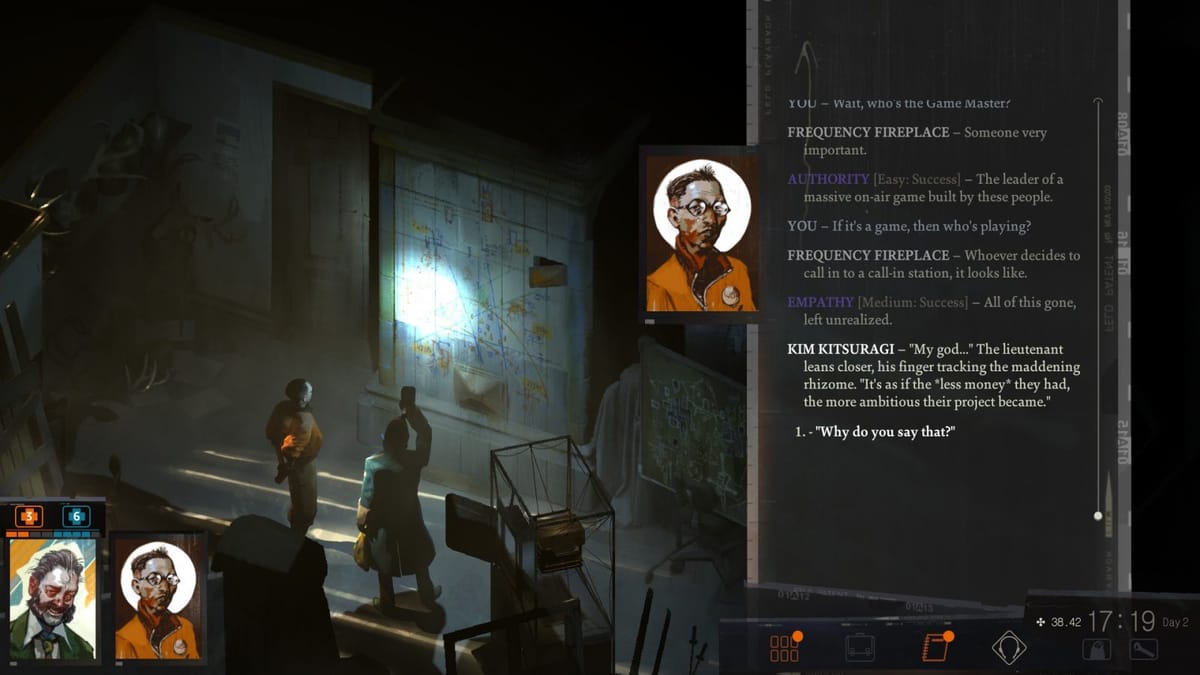
Right at the outset, Disco Elysium makes it clear that it’s a different kind of game than its cRPG trappings might suggest. In fact, even calling it a different kind of game might not be quite right. That implies that there are other games like Disco Elysium, that it fits snugly into some genre or tradition, and it really doesn’t. I can’t tell you what kind of game Disco Elysium is, but I can tell you that it’s a game where your thoughts are the most important aspect of your character, you can shirk your mission objectives to collect trash for money, you can die from sitting in a particularly uncomfortable chair, and passing skill checks can sometimes be as dangerous as failing them. For now, Disco Elysium stands as a wholly unique experience, but I’ll be shocked if we aren’t looking back at it as a ubiquitous influence on some of the best games coming out five years from now.
If you’re looking for a reference point, Planescape: Torment is the best you’re going to get. Disco Elysium bears more than a passing resemblance to the classic Black Isles RPG, mainly in that both games are isometric RPGs that progress mainly through the player character’s conversations with NPCs and observations of their surroundings. In Disco Elysium, you’ll trek back and forth through the city of Revachol looking for clues to help solve a murder and complete dozens of smaller objectives along the way, making choices entirely through dialogue options, even when things turn violent. The pacing occasionally feels off, as the game sends you back and forth across the city to speak to a certain person or hunt for a specific item, but there’s often so much to do and so many interesting things in the environment that even this traipsing around never gets too dull. Disco Elysium uses this fairly traditional structure to explore a host of political and metaphysical philosophies, build a convincing model of a city on the verge of ruin, and explore one of the most interesting skill systems ever in an RPG.
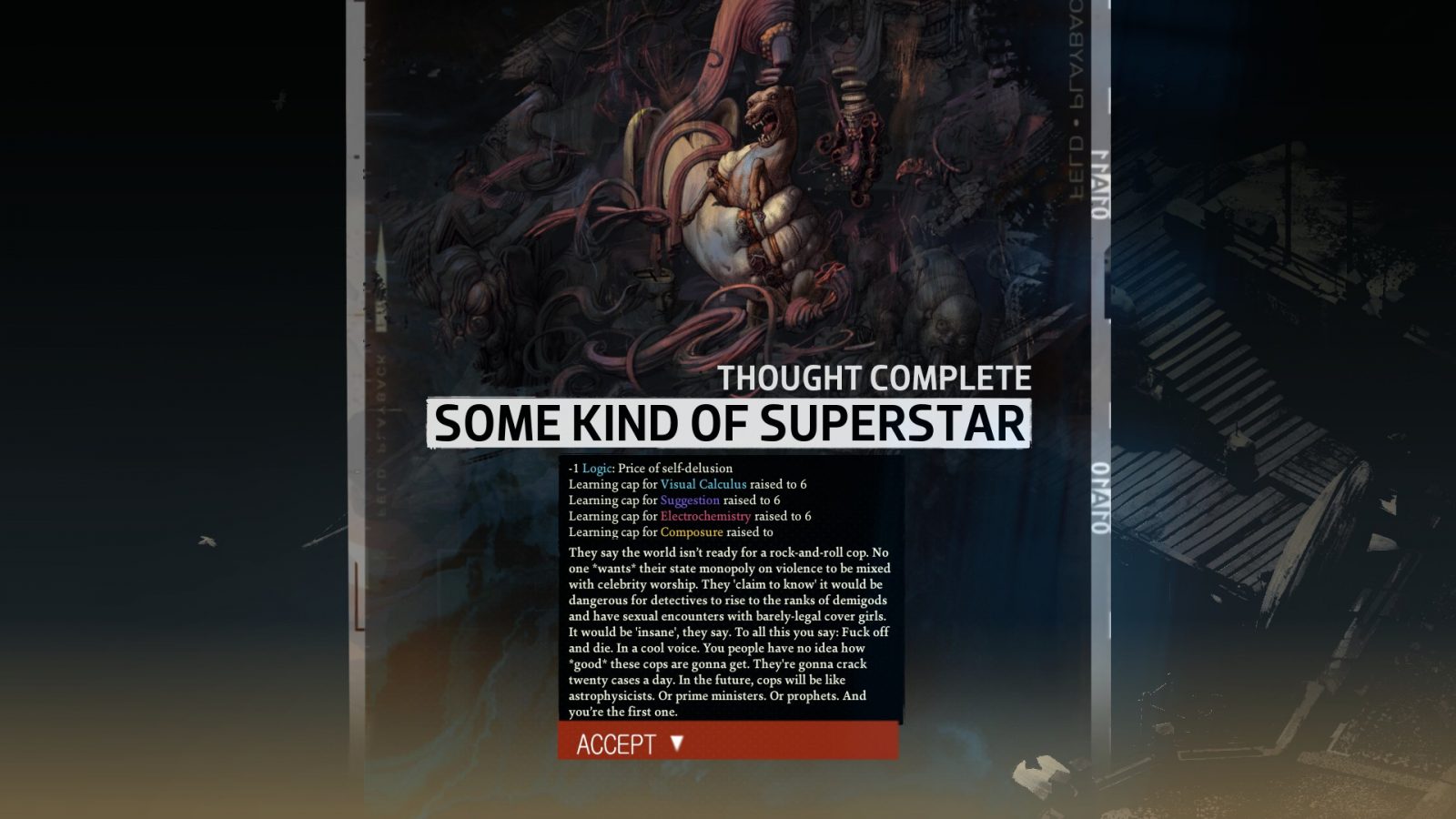
Your first look at Disco Elysium’s skill sheet is likely to be daunting. Arranged on a grid are 24 esoterically named skills (like Physical Instrument, Conceptualization, Electrochemistry, and Inland Empire), each with its own icon looking like something halfway between an X-ray and an expressionist portrait. It seems designed to be overwhelming, almost inviting you to make choices you’ll regret later, which actually ends up being thematically in line with the rest of the game. By leveling up, you’ll gain points to put into these strange attributes, which are as much personality traits as they are skills. They don’t just determine what kind of things you’re good at, but how you think. Points in Empathy will make you better at reading people, but also more interested in what’s going on in other people’s heads. Half Light will help you anticipate danger, but also leads you to see threats around every corner. These skills will increase your chances of success in explicit checks, such as when you want to intimidate someone or force open a door, but they’re also constantly firing off in the background as your talk to people and examine objects, with successes and failures determining not only your conversation options and how much information you get from your observations, but also the emotional tone of the game. Playing a highly physical character will turn you into a short-tempered brute, while playing a sensitive one will leave you open to the inscrutable, sometimes dubious mystical undercurrents of the world. It’s an unbelievably deep system, with every conservation seeming to have countless different ways it could play out.
There are ways to turn the odds in your favor, either by changing your clothes or taking drugs to improve certain skills, or by keeping a stash of skill points in your back pocket to spend to retry checks, but Disco Elysium manages to make failure at least as interesting as success. Rarely will failing a skill check simply mean that you can’t do the thing you wanted to do. Missing a Suggestion check might lead you to make an unconvincing argument; failing a Logic check could let a character trick you into believing a lie. Disco Elysium is in many ways a game about failure. A recent communist revolution in the game’s world failed, your character is largely a failure as a detective, the people of the fictional city of Revachol seem to keep failing in myriad ways, and likewise you will fail skill checks over and over, yet the world keeps spinning. Failure is always an option in Disco Elysium, and it’s not always the worst one.
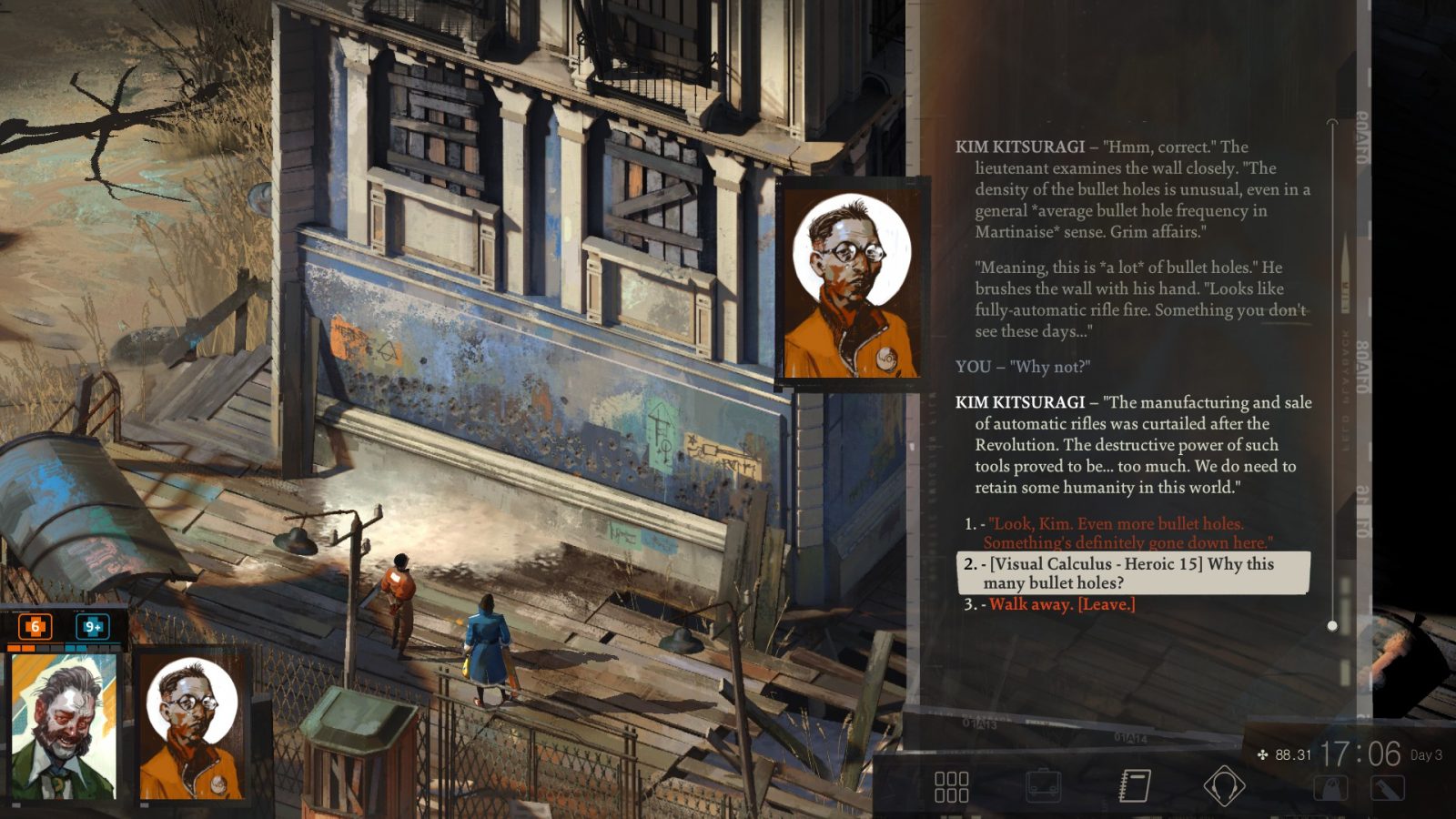
Where Planescape set its action in an interdimensional crossroads, Disco Elysium takes place in the more mundane environs of Revachol, a city situated in the island nation of Martinnaise, which is still unsettled after a communist revolution was quashed by a global centrist coalition. You play as a detective who wakes up in a trashed hotel room, recovering from a bender so dire that you don’t remember your own name, let alone what you’re doing in Revachol. In due time, and with the help of your partner, Kim, you discover that you’re here to investigate a murder that took place a week ago behind the hotel where you’re staying — a murder you’ve ignored so thoroughly that you haven’t even examined the corpse, and that threatens to tear Revachol apart. From then on, it’s up to you to solve the murder and keep Revachol from descending into chaos, all while exploring the city to complete dozens of side quests and uncover the bizarre and impossible things hiding in its shadows.
Before you can do that, you’ll need to get dressed. Your character in Disco Elysium is a trainwreck, to put it mildly. The game’s first quests involve tracking down your missing shoe, finding a way out of your hotel room, and maybe retrieving your tie from the ceiling fan (if you can reach it without your speed-addled heart giving out). As you stumble your way through these opening moments, you’ll start to come to grips with some of the things that make Disco Elysium such a unique experience. The most obvious is that it’s a grotesquely beautiful game, both in terms of its hand-painted environments and its writing. The game renders Revachol and its inhabitants in all their downtrodden glory, with ruined buildings, bloated corpses, and trash-strewn streets rendered as lovingly as the bucolic landscapes and majestic cities that might be found in more traditional RPGs. Its writing is just as gorgeous and just as obsessed with squallor. Disco Elysium is defined as much by its writing, its tone, its attitude, as it is by its intricate skill system. If you can’t get into its overwrought, snide style, Disco Elysium may just not be the game for you, but if you’re willing to wade through the (again, beautifully depicted) muck and some of the purplest prose you’ll ever read, it’s an experience unlike any other.
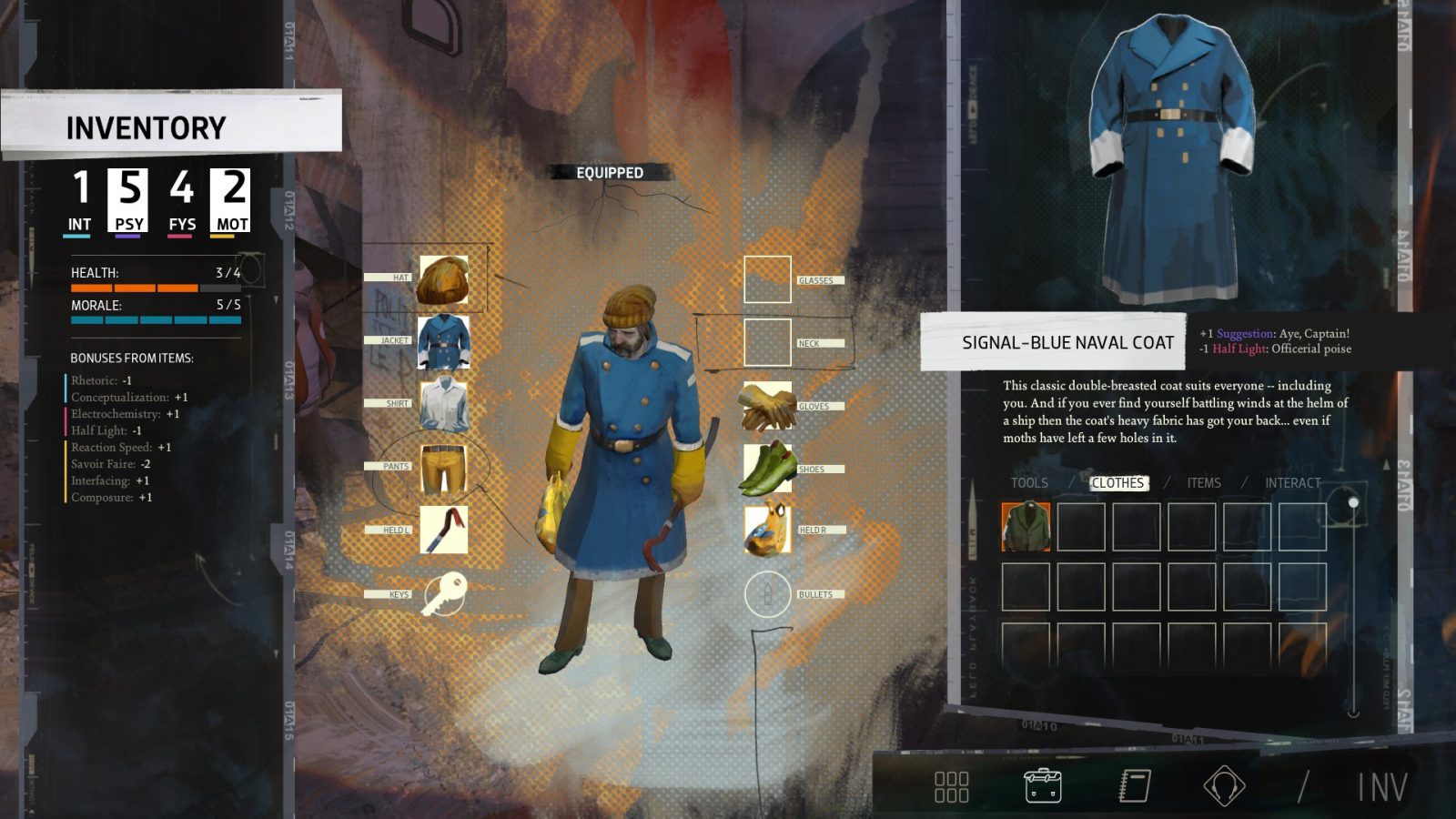
That muck can be incredibly difficult to wade through, though. Things are grim on the surface in Revachol, and they only get darker the deeper you go. Even if you’re playing as casually as possible, not considering any of the game’s political underpinnings, it can be unbearably nasty. Among the citizens of Revachol you’ll interact with are racists, homophobes, misogynists, and fascists, and they’re not shy about airing their prejudices. The worst of their slurs are censored, but it can still be deeply unpleasant to have a conversation with a phrenologist about his ridiculous theories on “race realism,” and it’s even more unpleasant when you’re given the ability to agree with him. You’re of course never forced to agree with any of Revachol’s worst dirtbags, but the option is often there. Just having to read through racist screeds to progress through the game can be draining, and it’s hard not to be put off by the idea that somewhere out there, there may well be someone using the game as a playground for their worst impulses.
Not all of Revachol’s citizens are quite so regressive, though. Mostly, they’re people whose lives have been torn apart by a revolution that didn’t even succeed, just blew apart their home and invited the forces of capital to keep a close eye on them as they picked through the rubble. There are decent people in Revachol, and moments of genuine joy and wonder to be found in Disco Elysium. Something as simple as a karaoke performance, a brief moment of understanding, or two characters comforting each other after a disaster can be at once funny and unexpectedly moving. Many of the most transcendent moments, the ones that I expect will stick with me for years, push at the bounds of reality. Unexplainable things lurk in Revachol, but the people there are often too weighed down by their collective trauma to even see the numinous side of their city.
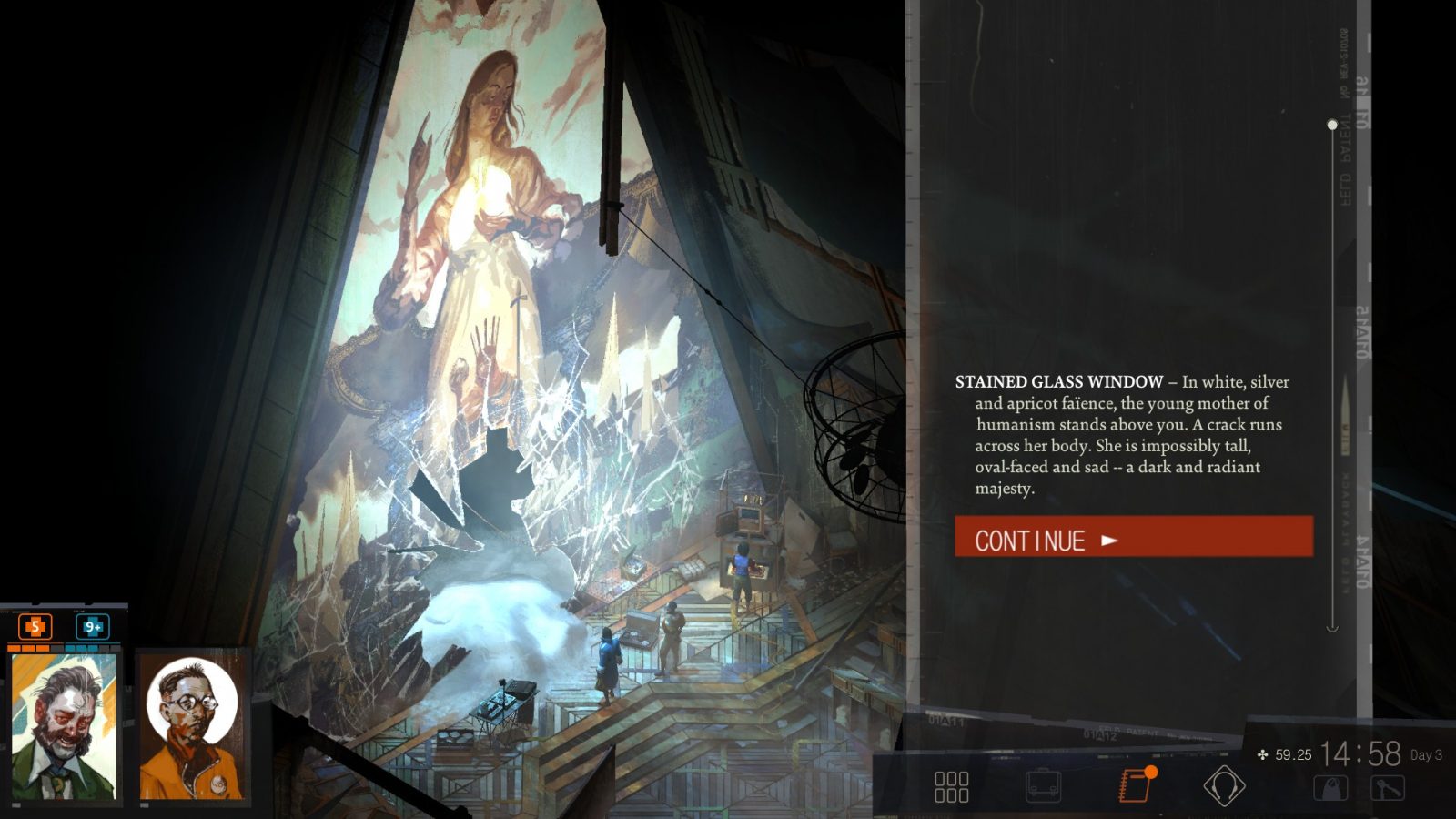
Between these short, glowing encounters, though, Disco Elysium can be crushingly cynical. It presents all kinds of viewpoints, a vibrant and varied populace expressing deeply held beliefs, but seems to sneer at all of it. You can choose to embody any of a range of values and ideologies, just as Revachol’s people do, but Disco Elysium’s main position is ultimately nihilistic, employing the kind of bleak laughter that often conceals fear of having one’s stance criticized, or the embarrassment of being too earnest about anything at all. One of Disco Elysium’s great failings, at least in my playthrough, was that any attempt I made at genuinely following an ideology or sympathizing with the people of Revachol was rebuffed, not by some action in the game’s plot, but by the thick layer of irony and cynicism in the writing. It expertly depicts a citizenry whose history and daily life are ruled by competing ideologies, but the game itself laughs at all of them, unwilling to take the decisive step of imbuing any with dignity.
Despite its cynicism, the sheer density of Disco Elysium’s setting ends up taking on an ideological dimension of its own. The playing field is quite small for an RPG like this that will take dozens of hours to complete. Within essentially just a few city blocks, the game packs enough detail, enough little self-contained stories, that you could conceivably finish a playthrough with half of it untouched. It’s impressive how many seemingly disparate threads come together to explain or expand or just touch the main case. Not in a way that feels contrived, that everything is all just one big story exploded arbitrarily across different side paths, but in a way that suggests a much deeper underlying unity.
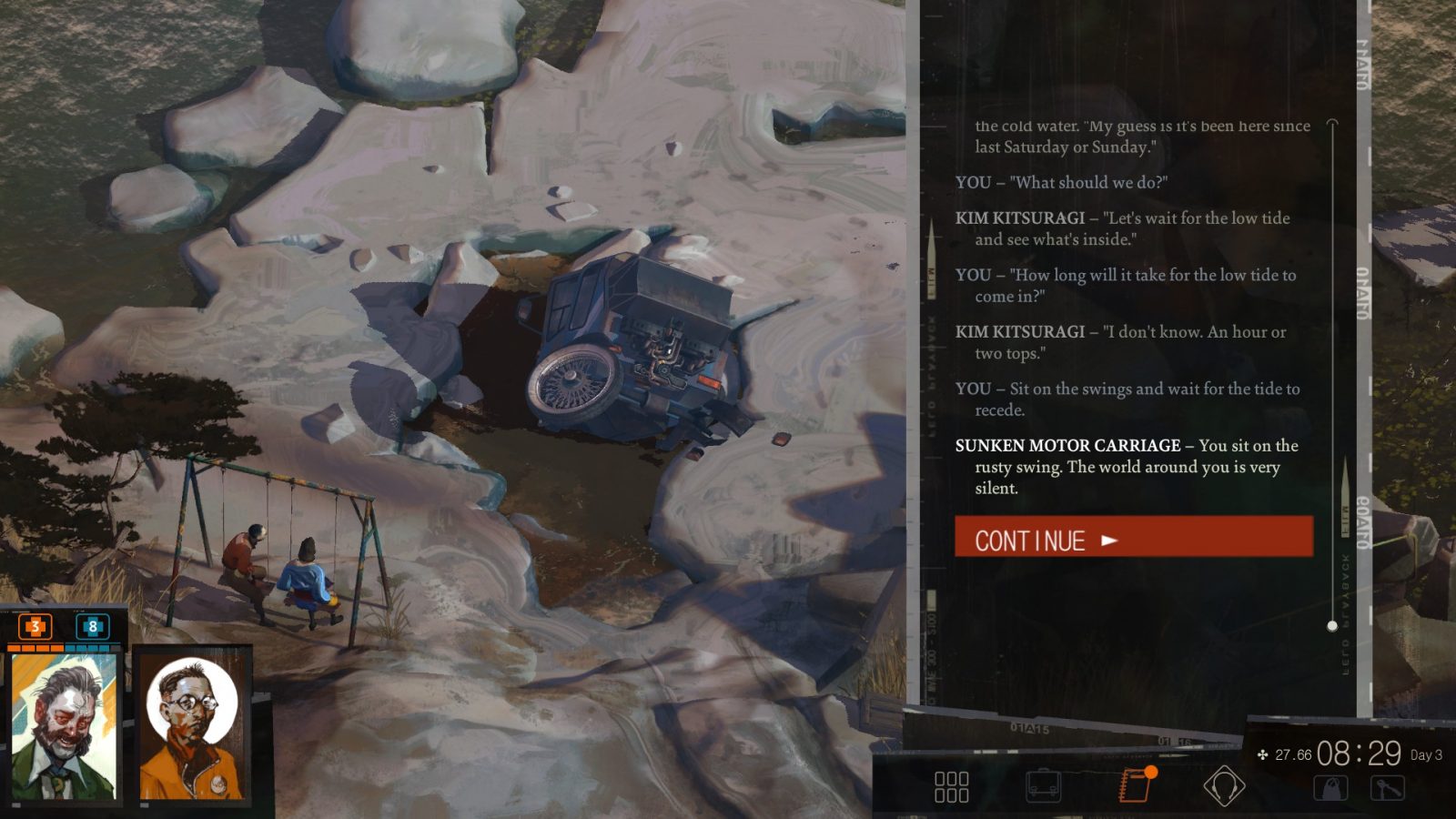
The city of Revachol is a community, and the people in it are connected. Their lives are intertwined by the simple fact that they share this space, breathing in the same air, living their lives in the same environment. Even the things most people aren’t even aware of, the supernatural phenomena woven into Revachol, can play a major part in the city’s fate. Likewise, all your detective’s disparate skills are connected, important to a larger whole, even when they seem to be at odds. When you solve a puzzle using logic, it’s not logic alone that saved you. You gathered clues by getting people to confide in you, by chasing down spooky feelings, by forcing open doors and by sheer tenacity and legwork. The driver stuck in a traffic jam and the pissed-off cafeteria manager have just as much a part to play in the community as the government agent and the union boss, much in the same way that brute force, quick reflexes, and pure animal instinct make up a human being as much as empathy, reasoning, and willpower do.
Disco Elysium makes a compelling case that there are wonders hiding in the corners even of a ruined city, and that our own psyches are as much a mystery to solve as a murder case. It makes its case through mechanics as much as story, and even in the way it hides beautiful, humane moments even under its own unrelenting nihilism. It can be distinctly unpleasant for long stretches, but it’s shot through with such a sharp sense of humor, a delirious range of choices to make, and rare glimpses of beauty and brain-melting oddity to make it an essential experience and one that will likely influence games for years to come.
Disco Elysium
Excellent
Disco Elysium is a difficult game to describe, but it’s easy to recommend. One of the most inventive games in recent memory, it’s an often cynical, mean-spirited RPG that’s nonetheless full of beauty and humanity. While its obsession with the nastier parts of the human psyche will definitely turn some people off, the depth of its story and systems reward a deep dive into the mire, as do its beautiful art and writing.
Pros
- Gorgeous, tonal interesting writing
- Beautiful art style makes even its grotesque elements look great
- Deep, rewarding, utterly unique skill system
Cons
- Unrelentingly cynical tone can be a turn-off
- Pacing can drag at some points
